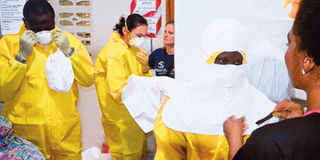Sierra Leone dissolves Ebola response center

The mandate of Sierra Leone’s National Ebola Response Center (NERC) has come to an end, an official announced Monday. PHOTO | NMG
What you need to know:
The tenure of the body set up to handle the Ebola response ended officially on December 31, said Francis Langoba Kelly, Director of Planning and Interagency Relations at the Office of National Security (ONS).
Freetown. The mandate of Sierra Leone’s National Ebola Response Center (NERC) has come to an end, an official announced Monday.
The tenure of the body set up to handle the Ebola response ended officially on December 31, said Francis Langoba Kelly, Director of Planning and Interagency Relations at the Office of National Security (ONS).
NERC was created in October 2014 after two previous bodies set up in response to the epidemic proved incapable of containing the spreading virus that emanated from neighboring Guinea.
After nearly 4, 000 fatalities among over 8, 000 infections, Sierra Leone was finally declared free of the virus by the World Health organization (WHO) on November 7.
But as a precaution the government thought it fit to retain the institution until the end of the year, so that it can oversee part of the 90-day enhanced surveillance period sanctioned by the world health agency.
The responsibilities of the NERC have now been spread among the Ministry of Health and Sanitation (MoHS), the Ministry of Social Welfare, and the ONS which will take the lead, Kelly said.
The District Ebola Response Centers (DERCs) have been absorbed by the District management Health teams, he added.
ONS is a security policy making body that falls directly under the office of the President.
“[ONS] will provide overall mobilization and control the resources of all national security issues, including disasters and imminent outbreak of diseases like Ebola,” said Mr Kelly.
But the idea of transferring the responsibilities of the NERC, which was run jointly by the government and development agencies, had been received with skeptism by the public. Some people fear the expertise within the institution can’t be replaced.
But the government has cited the financial implications in keeping in place the mainly key expatriate staff who run it.
The NERC`s key offices, like the head of the Situation Room, which coordinated its day to day responses, and the Planning Directorate, were headed by diaspora based Sierra Leones hired by the UN. (AFP)




